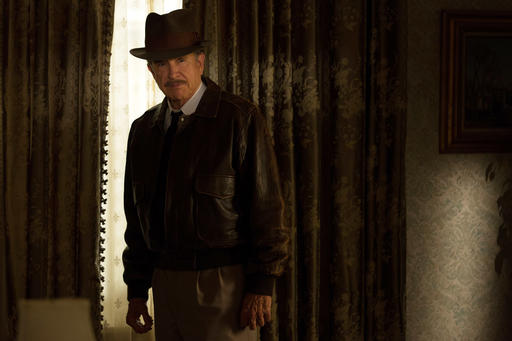Fall Preview: Warren Beatty’s Hughes film finally takes off

This image released by Twentieth Century Fox shows Warren Beatty as Howard Hughes in a scene from, “Rules Don’t Apply,” in theaters on Nov. 23. AP
NEW YORK — Warren Beatty is standing outside an early screening of his new film, “Rules Don’t Apply” — definitely NOT a Howard Hughes biopic, he wants to make clear — discussing his connection to the famously reclusive industrialist and movie mogul.
“I never met him,” he says, grinning. “And I met everybody.”
At 79 and 15 years since his last film, the man affectionately known as “The Pro” is back. Beatty, whose exploits on and off the screen made him an unqualified Hollywood legend, has finally made the Howard Hughes film he’s contemplated on and off for 40 years.
The focus of the film — written, directed, produced and starring Beatty — has shifted with time. Its central characters are a Southern Baptist actress (Lily Collins), one of two dozen Hughes has put up in bungalows for either starlet or romantic consideration, and her young Methodist driver (Alden Ehrenreich). They’re both ambitious but innocent new arrivals to Los Angeles hoping to catch a break with their unseen benefactor.
Not coincidentally, the year is 1958, the same year Beatty — a Virginia Southern Baptist, himself — came to Hollywood, following his sister, Shirley MacLaine. “I got kind of lucky kind of fast when I came out here,” says Beatty, who was taken under the wing of Elia Kazan and cast in 1961’s star-making “Splendor in the Grass.”
Many doubted whether Beatty, a notorious fiddler and perfectionist known for bouts of indecision, would ever make his Hughes film. He first obtained the rights in the mid ’70s. But the happy surprise of “Rules Don’t Apply,” which 20th Century Fox will release Nov. 23 , is not only that Beatty has at last completed it, but that he’s made a snappy, vibrant film, carried by its young stars and memorable for its portrait of Hollywood power players and their pawns. Sex plays a significant role.
“I felt it was time to make another movie and time to make a movie about a big subject — what I would call the comical and sometimes sad consequences of American sexual puritanism,” says Beatty. “That attitude, I don’t think it’s expired. We have to admit it’s made us the laughing stock of France, for instance, where the chief of state gets into some mischief and his numbers go up. Here the opposite is true.”
There’s something fitting about one of Hollywood’s most renowned playboys making a movie about sexual repression. Before marrying Annette Benning, Beatty was linked to everyone from Diane Keaton to Madonna. Peter Biskind’s 2010 biography, “Star,” tried to estimate the women he’s slept with, coming up with 12,775 — a figure Beatty disputes.
He and Benning (who has a smart part in the film) have four nearly grown children. Of his 180-degree turn from bachelor to family man Beatty says, “The idea of divorce appalled me and still does.” Family has been his primary interest in the years since his last film, the 2001 disappointment “Town & Country.” ”They’re more interesting than any movie,” he says.
The title “Rules Don’t Apply” is also well suited to Beatty, who reigned over 1970s Hollywood and later with distinctly unconventional films like the era-defining “Bonnie and Clyde” and the communist epic “Reds.” ”Bonnie and Clyde” he made happen at a time when it was seen as arrogant for, as he puts it, “a pretty boy in the movies” to produce a film. Beatty was also unusually outspoken politically, and used his celebrity for political influence.
“I grew up in a circumstance where there were societal rules, there were rules laid down by custom or religion,” says Beatty. “I don’t know that I’m such a courageous rule-breaker but I do like it when you say it. I’ve been very lucky. The words that might sum it up are: The access that early fame and fortune can bring one if they are alert. Rules will be changed. Rules will be broken.”
Beatty, 15 times an Academy Award nominee and an Irving G. Thalberg Award recipient in 2000, hasn’t directed since 1998’s political satire “Bulworth.” He remains gentlemanly and deliberate with his words. Asked about his views on Donald Trump, he suggests anyone reading this article would already know his opinion. “I hope you’ll put in parentheses, ‘He said laughingly,'” he adds.
Beatty now finds himself wading back into a somewhat foreign movie business. “The public seems to want to know what it’s going to get before they leave the house,” he says. “I think that sort of applies to fast food also.”
But another trend is more heartening to him: “I would say that the biggest change the world is going through … is the liberation of the female,” says Beatty.
He’s been attending screenings of “Rules Don’t Apply” partly to get a better feel for today’s movie distribution. Looking over at a small theater before the movie starts, he sardonically observes: “You’re all on your iPhones.”
Asked how it feels for him to finally be releasing his Hughes film, Beatty smiles. “Old,” he says.
Yet Beatty has already navigated a series of eras in Hollywood. What’s one more? TVJ